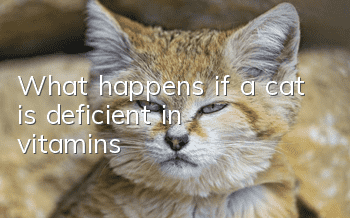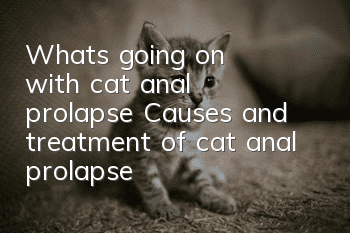What happens if a cat is deficient in vitamins?

I am not a professional doctor, nor do I know how to see a doctor via video. These things are collected from the Internet. I will share them with you today. When I was studying, I thought these were very well written. Please read them carefully in your spare time. More It is always good to know something. If the cat at home is sick, please go to a professional institution for treatment. This is especially important for some second- and third-tier cities where medical conditions are not very good. Please trust the professional judgment of the doctor.
What happens if a cat is deficient in vitamins?
Please do not believe those so-called online diagnoses, video doctor visits, miraculous medicines handed down from ancestors, secret recipes of old Chinese medicine, and please purchase medicines from professional institutions.
Vitamin A deficiency
Vitamin A deficiency can cause systemic diseases, characterized by stunted development, neurological dysfunction, eye disease, epithelial cell keratinization, and decreased fecundity.
Symptoms: Kittens suffering from this disease may show symptoms of lethargy, growth stagnation, anorexia, unsteady gait, digestive disorders, and symptoms of anemia, diarrhea, physical exhaustion, or respiratory diseases.
Adult cats are often anorexic, emaciated, and have sparse coats. As the disease progresses, dandruff increases and the conjunctiva becomes inflamed, leading to shyness and tears. If bacterial infection occurs at this time, corneal ulcers and perforations may even occur. Although the female cat's condition is mild, she can still be in estrus and become pregnant. But it is prone to miscarriage or even stillbirth. Female cats will not be in estrus when they are seriously ill, and male cats will have testicular atrophy and few or no sperm in their semen.
Treatment: You can supplement sick cats with vitamin A capsules at 400 units per kilogram of body weight for 10 days.
Prevention: When buying cat food, you can pay attention to the vitamin A content in the nutritional formula table. The international recommended value (pregnant female cats and developing kittens) should be ≥9000 international units/KG. Adult cats are ≥5000 international units/KG (cannot exceed 750000 international units/KG)
Vitamin D deficiency
Feline vitamin D deficiency is also known as feline rickets. The deficiency will cause calcium and phosphorus metabolism disorders, cartilage ossification disorders, and insufficient bone salt deposition. Common in kittens aged 1-3 months
Symptoms: Initial loss of appetite, indigestion, heterophilia, likes to lick walls, floors, soil, gradual weight loss, slow growth, swelling and deformation of joints, bending of long bones, or "X" or "O" legs type, leading to lameness or lying on the ground. Sick cats may also cause lumbar spine depression, which directly compresses the rectum and causes constipation.
Treatment: should be increasedActivities outdoors, sunbathing more, or taking vitamin D 3.1 million to 200,000 international units, intramuscular injection (it is recommended to go to the hospital for treatment)
Prevention: The feed should be rich in protein, vitamin D and calcium, phosphorus ratio, and increase outdoor activities and get more sun. In winter, kittens should be given more exercise and sunlight exposure.
According to the recommended value, the protein should be around 39%
Vitamin D (pregnant female cats and developing kittens) should be ≥750 international units/KG
500 international units/KG≤(adult cat)≤10000 international units/KG
Vitamin E deficiency
Vitamin E is also called tocopherol. Once lacking, it will obviously affect the development of sexual organs. If the female cat is sick, the placenta and fetal development will be affected during pregnancy, which may cause empty pregnancy, miscarriage, and death of the kittens. Male cats have underdeveloped testicles and reduced or degenerated sperm motility.
Symptoms: Cats suffering from this disease will be obese, exhibit non-suppurative fatty tissue inflammation and subcutaneous edema. Most sick cats will suffer from hind limb paralysis, muscle weakness, instability, and then die due to spasms and coma. Reddish-brown urine or coal-tar-like loose stools will appear before death. Chronic diseases include long-term loss of appetite, weight loss, weight loss, coarse and dull coat, paralysis of hind limbs, and loose stools. During palpation, there is pain in the back and abdomen, and there are strips or sheets of hard clot in the groin
Treatment: Orally take 3-5 mg of vitamin E, 10-15 mg of vitamin B complex, and 5-10 mg of vitamin C for seven days. If the condition is serious, intramuscular injection is recommended (must see the doctor for specific instructions)
Prevention: Make sure to provide 0.4-0.6 mg of vitamin E daily
B vitamin deficiency
Cause: Long-term storage of feed causes the destruction of B vitamins (thiamine), thus causing B vitamin deficiency. Deficiency of B1 is usually more common, while deficiencies of other B vitamins are less common.
Symptoms: The initial symptoms of sick cats are caused by the lack of vitamin B1 in the feed fed within 1-2 weeks. Sick cats show salivation, inability to eat the food they want, weight loss, and vomiting. Severe cases include loss of appetite, weakness, rough coat, arched back, severe neurological disorder, destruction of normal reflexes, short-term tonic twitching of the flexor muscles under the neck, and dilated pupils in some cases. Or they are spinning in circles, their limbs are spasming incessantly, or their heart function is disordered, they are in a semi-conscious state, and they continue to scream.
When sick cats lack other B vitamins, B2 (riboflavin) deficiency: ulcerative stomatitis, conjunctivitis, "pellagra"uo;, Vitamin B3 (pantothenic acid): Developmental retardation or stagnation, gastrointestinal disorders including fatty liver and ulcers.
Vitamin B5 (niacin): Oral inflammation, accompanied by ulcers, thick, blood-stained saliva dripping from the mouth, and a foul smell exhaled
Vitamin B6: weight loss, anemia, urinary tract stones
Prevention:
Vitamin B1 (pregnant female cats and developing kittens) ≥5.0 mg/KG, adult cats ≥5.0 mg/KG
Vitamin B3 (pregnant female cats and developing kittens) ≥60 mg/KG, same as for adult cats
Vitamin B5 (pregnant female cats and developing kittens) ≥5.0 mg/KG, same as for adult cats
Vitamin B6 (pregnant female cats and developing kittens) ≥4.0 mg/KG, same as for adult cats
- What are some ways to choose cat food for Persian cats?
- Can pet cats be brought on the high-speed train?
- How to feed a one and a half month old cat
- Introduction to some common diseases of cats
- Should a one month old kitten drink water?
- How to train a cat to understand the "come here" command? Cat training!
- First aid method for cat shock, a must-have for families!
- What do I need to transport a cat on a plane?
- Male cats sometimes meow at night
- Why does a Siamese cat’s coat color change?



